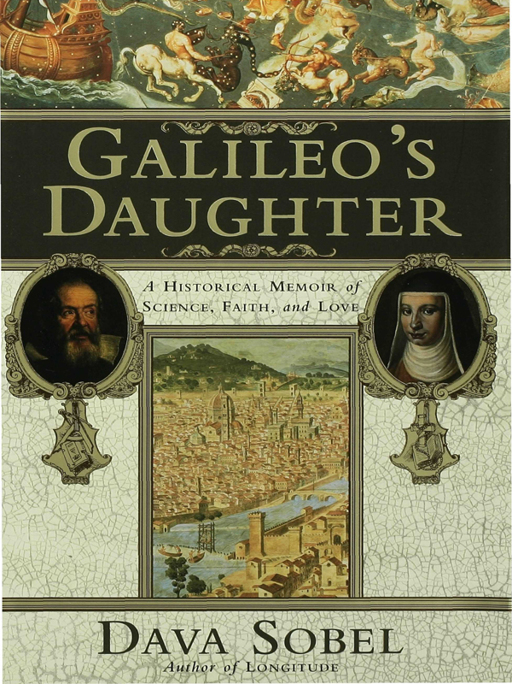
Galileo's Daughter
A Historical Memoir of Science, Faith and Love
فرمت کتاب
ebook
تاریخ انتشار
2009
Lexile Score
1530
Reading Level
12
نویسنده
Dava Sobelشابک
9780802777478
کتاب های مرتبط
- اطلاعات
- نقد و بررسی
- دیدگاه کاربران
نقد و بررسی

Starred review from October 4, 1999
Despite its title, this impressive book proves to be less the story of Galileo's elder daughter, the oldest of his three illegitimate children, and more the story of Galileo himself and his trial before the Inquisition for arguing that Earth moves around the Sun. That familiar tale is given a new slant by Sobel's translation--for the first time into English--of the 124 surviving letters to Galileo by his daughter, Suor Maria Celeste, a Clarisse nun who died at age 33; his letters to her are lost, presumably destroyed by Maria Celeste's convent after her death. Her letters may not in themselves justify a book; they are devout, full of pious love for the father she addresses as "Sire," only rarely offering information or insight. But Sobel uses them as the accompaniment to, rather than the core of, her story, sounding the element of faith and piety so often missing in other retellings of Galileo's story. For Sobel shows that, in renouncing his discoveries, Galileo acted not just to save his skin but also out of a genuine need to align himself with his church. With impressive skill and economy, she portrays the social and psychological forces at work in Galileo's trial, particularly the political pressures of the Thirty Years' War, and the passage of the plague through Italy, which cut off travel between Florence, where Galileo lived, and Rome, the seat of the Pope and the Inquisition, delaying Galileo's appearance there and giving his enemies time to conspire. In a particularly memorable way, Sobel vivifies the hard life of the "Poor Clares," who lived in such abject poverty and seclusion that many were driven mad by their confinement. It's a wholly involving tale, a worthy follow-up (after four years) to Sobel's surprise bestseller, Longitude.

January 1, 2000
Like Sobel's best-selling Longtitude, this is a compelling and gracefully written science history, retelling the familiar story of Galileo's battle with the Roman Catholic Church through the letters of his daughter, a cloistered nun. What results is a new view of the scientist. (LJ 10/1/99)
Copyright 2000 Library Journal, LLC Used with permission.

Starred review from October 1, 1999
Sobel, a former New York Times science writer and author of the surprise best-seller Longitude, has produced another creative and compelling work. In addition to the surviving letters from Galileo's daughter, which Sobel has translated into English for the first time, she has done broad and imaginative research to write a science biography that reveals her technical insight and originality. Galileo's daughters, Virginia (the daughter of the title) and Livia, were admitted to the Convent of San Matteo while they were in their early teens and spent the remainder of their lives in that cloistered setting. Virginia, who took the name Maria Celeste, was very close to her father and demonstrates a keen mind and scientific understanding in her letters to him. As he proceeds with his discoveries that led to his theory that Earth moves around the sun--an argument that directly countered the teaching and position of the Catholic Church--Galileo's communication with her demonstrates his reconciliation of science and religion. Unfortunately, the Pope and his advisers were not of similar resolution. Sobel has a remarkable ability to explain technical subjects without being simplistic or pedantic. There is a tremendous amount of fascinating detail in this work, and yet it reads as smoothly and compellingly as fiction. Highly recommended. [See interview with Sobel on p. 128.--Ed.]--Hilary Burton, Lawrence Livermore National Lab., Livermore, CA
Copyright 1999 Library Journal, LLC Used with permission.

Starred review from August 1, 1999
As often is the case with religious landmarks in history--in this instance, Galileo's prostration before the Inquisition--a deeper searching reveals more textures than simple science-versus-religion symbolism. But it takes a talented storyteller to bring them forth, and Sobel meets our high expectations with this work, the legacy of her account of the inventor of the seagoing chronometer in "Longitude" (1995). Sobel is aided by a unique resource: more than 100 letters to Galileo from his eldest daughter that have never before been published in translation. They appear here largely verbatim and have been skillfully integrated into the contextual events of early 1600s Italy--no mean narrative feat, considering that this daughter, who took the veil and the name Maria Celeste, never in her short adult life ventured beyond her order's walls. The letters' somewhat trepidant salutation, "Most Illustrious and Beloved Lord Father," belies what was apparently a profoundly fond relationship on a filial level (a conclusion supported by the surprise Sobel springs at the end), but it was respectful on an intellectual one: there are allusions to Maria Celeste copying over Galileo's "Dialogue concerning the Two Chief World Systems," "the work that attracted the ire of the inquisitors. Their lives are set in motion against a background that includes family finances, Florentine and papal politics, the bubonic plague, and the Copernican revolution, which Galileo was championing as discreetly as was safe to do. Succinct in describing where, and where not, Galileo was heading in correct scientific direction (he didn't understand tides, for example), Sobel connects the tempests of his world to the cares and anxieties of Maria Celeste's. "A woman of exquisite mind, singular goodness, and most tenderly attached to me," eulogized the father when she suddenly died amidst his persecutions, an aptly allusive summing up of the subject of Sobel's singularly affecting story. ((Reviewed August 1999))(Reprinted with permission of Booklist, copyright 1999, American Library Association.)

























دیدگاه کاربران